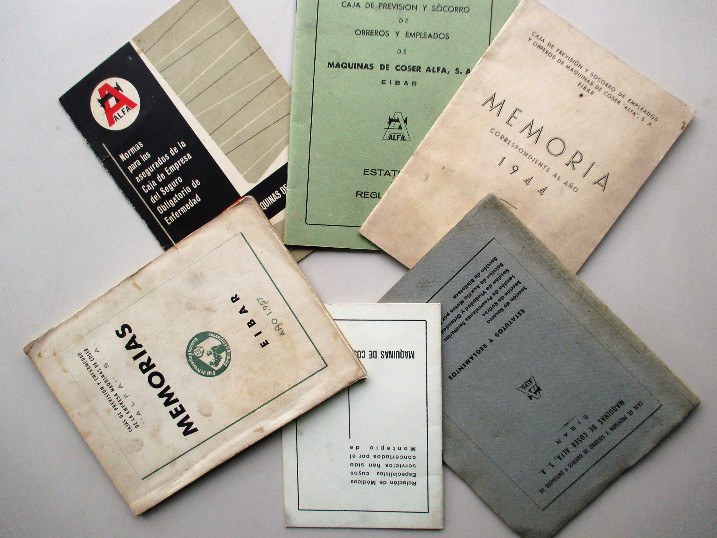Alfa manuals, statutes and reports

In 1920, a group of arms workers joined forces to create a cooperative, called the “Sociedad Anónima Cooperativa de Producción de Armas de Fuego Alfa”, with a capital of 300,000 pesetas. The first workshop had its premises in the Calle Vista Alegre. Although it started making revolvers of the Smith & Wesson type, or “esmitzak”, given the circumstances at the end of the First World War, the company soon took the decision to make and sell sewing machines. This turn to sewing machines wasn’t simply a whim: making these machines was compatible with the kind of machinery they had and with the workers’ skills. By then Alfa had changed its address to Paseo San Andrés.
In 1927 they produced 1,750 machines; however, by 1935 they were turning out 12,000 and were pioneers throughout Spain. Between workers and delivery staff, more than 1,000 families lived off Alfa at one point in time.
In 1946 they started selling abroad, and by the 60s they already had their own market network: sales branches, representatives and agencies in all of the capital cities. They exported to more than 70 countries, above all to the UK, France and Mexico, where they also had a factory. As well as being the biggest factory in Eibar, it was also the most famous and respected. In fact, workers at Alfa seemed to have a different, more privileged status.
For decades they remained faithful to their purpose, or reason to be, as a cooperative created to provide a service to society. The workers at Alfa, as can be seen from these books, enjoyed greater benefits than the workers in any other company: financial assistance for their retirement, in the case of illness, for widows, and for buying medicine, among others. They also built houses for those who worked there; created schools and summer camps for their children; and provided canteens, shops and libraries for their workers and office staff.
Some of the most interesting curiosities we discovered when reading these documents are:
• The rules for those insured stipulating the steps to be taken in the event of being off work with illness.
• On the list of specialised doctors, Dermatology is explained as being a service that treats skin ailments; and the Endocrinology service is called “Nutrition and Internal Secretions." There was also a pediatrics surgery for the workers’ children in the Avenida del Generalísimo.
• If they were off work due to illness, the workers had the right, for up to six months, to receive 37% or their wages; however, they were subject, among others, to the following conditions: “Not to enter any public establishment, and very specifically those selling food and drink” and “To go home before 9 o’clock at night in summer and 6 o’clock in winter.”
• Workers at Alfa, or their wives, received a bonus of 500 pesetas (3 euros) when they got married and for every child born. Widows or orphans received 1,000 pesetas (6 euros), as well as a monthly pension, the amount of which depended on the number of children (90% of the wage for 5 children or more).
• Workers retiring after 20 years of service had the right to receive 70% of their wage as a pension; however, if they worked for 35 years, they received 85%.
• The library was open from 6:30 to 19:30. For every book taken out they had to pay 0.50 pesetas (0.003 euros), and, if they lost the receipt, the fine was 2 pesetas (0.012 euros). The worker could borrow one “light reading” book and another on the subject of their work, but never two easy readers at the same time.
Consult the documents here
Don’t miss this chance of a first-hand look at the Museum’s small collection of manuals and statutes.

